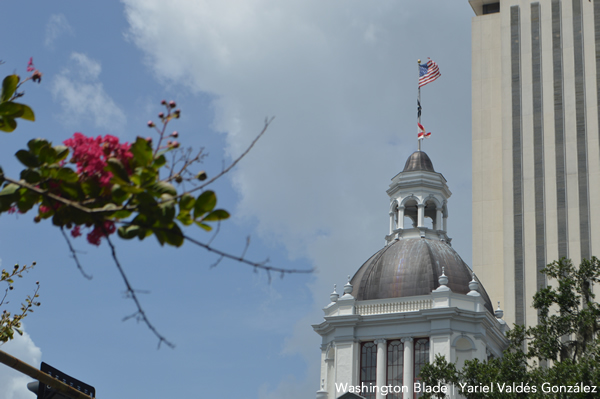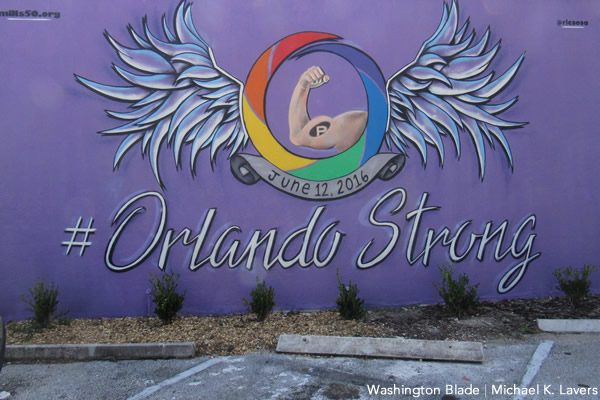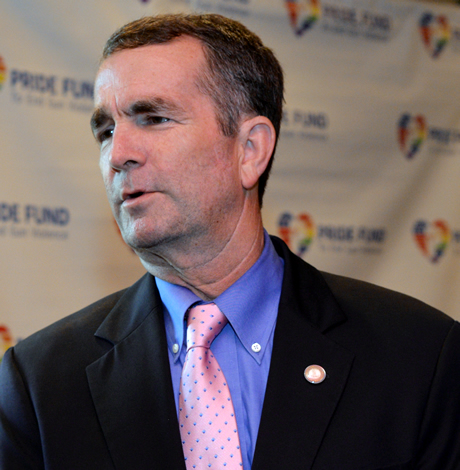National
‘We’re still very much in the healing phase’
Saturday marks five years since Pulse nightclub massacre

Saturday marks five years since a gunman killed 49 people inside the Pulse nightclub in Orlando, Fla.
A remembrance ceremony will take place at the site, which is now an interim memorial. A number of other events to honor the victims will take place in Orlando and throughout Central Florida over the coming days.
“We’re still very much in the healing phase and trying to find our way,” Pulse owner Barbara Poma told the Washington Blade on Tuesday during a telephone interview.
The massacre at the time was the deadliest mass shooting in modern U.S. history.
Nearly half of the victims were LGBTQ Puerto Ricans. The massacre also sparked renewed calls for gun control.
Poma told the Blade that she expects construction will begin on a “Survivor’s Walk” at the site by the end of the year. A museum — which she described as an “education center” that will “talk about the history of the LGBT community and its struggles and stripes for the last century or so … about why safe spaces were important to this community” and what happened at Pulse and the global response to it — will be built a third of a mile away.
“We really feel it is important to never forget what happened at Pulse and to tell the story of that,” said Poma.
Poma noted the onePULSE Foundation of which she is the executive director met with representatives of the 9/11 Tribute Museum and the Oklahoma City National Memorial and Museum to discuss the memorial. Poma when she spoke with the Blade acknowledged the plans have been criticized.
“This kind of opposition is not unique to these kind of projects,” she said.
“It’s just important to know that really what we’re trying to do is make sure what happened is never forgotten and those lives were never forgotten,” added Poma.
Poma on Tuesday declined to comment on the lawsuits that have been filed against her, her husband and the onePULSE Foundation in the wake of the massacre.
DeSantis’ anti-LGBTQ policies overshadow anniversary
The Blade this week spoke with Equality Florida CEO Nadine Smith, state Rep. Carlos Guillermo Smith (D-Orlando) and other activists and elected officials in Florida and Puerto Rico who were part of the immediate response to the massacre.
Equality Florida raised millions of dollars for survivors and victims’ families. CEO Nadine Smith on Tuesday told the Blade during a telephone interview that Equality Florida in the massacre’s immediate aftermath pledged to honor the victims “with action by uprooting hatred at its source and from that time we have invested deeply in safe and healthy schools.”
“Schools are a shared cultural experience where the attitudes of ignorance and fear and animosity and violence towards others either get challenged or encouraged,” said Smith. “Five years later I look at how far this work has come and at the same time, I’m very aware of the backlash that we are facing, particularly in our schools with laws targeting trans youth specifically.”
Republican Florida Gov. Ron DeSantis on June 1 signed a bill that bans transgender athletes from participating in high school and college sports teams that correspond with their gender identity. The governor the following day vetoed funding that activists say would have funded programs for Pulse survivors and homeless LGBTQ youth.
Carlos Guillermo Smith, a gay man who represents portions of Orlando, on Tuesday described DeSantis as “callous.”
“The governor’s actions are a reminder that five years after the attack at Pulse nightclub, we have a lot of work to do to push back against homophobia and transphobia,” said Carlos Guillermo Smith. “The Orlando community is very supporting and accepting of the LGBTQ community, but when you see what’s happening at the Governor’s Mansion in Tallahassee, you realize that there’s a lot of work to be done.”
Pedro Julio Serrano, associate director of Waves Ahead, an LGBTQ service organization in Puerto Rico, described the massacre’s impact in the U.S. commonwealth as “permanent in our collective memory.” Serrano also noted violence against trans Puerto Ricans remains rampant.
“We are now the epicenter of anti-trans violence in the U.S. and its territories,” said Serrano. “After five years, we still confront this hatred that doesn’t seem to stop. We will continue to fight until all of us are safe.”

Tony Lima, a long-time Florida-based activist who is currently CEO of Arianna’s Center, an organization that serves trans women of color in Florida, the South and Puerto Rico, helped organize vigils and blood drives in the days after the massacre.
“We knew how important it was to aid our family in Orlando in this immediate crisis,” Lima told the Blade on Monday. “Orlando and South Florida are intrinsically connected. We often share resources in nightlife, events, advocacy and a lot of the same people … so I think there was a natural synergy there.”
Lima, like Nadine Smith and Carlos Guillermo Smith, sharply criticized DeSantis for signing the anti-trans bill and for vetoing funds for Pulse survivors and homeless LGBTQ youth. Lima also lamented the lack of progress on gun control.
A gunman on Feb. 14, 2018, killed 17 people at Marjory Stoneman Douglas High School in Parkland, Fla. Lima told the Blade there have been two deadly mass shootings in South Florida in recent days.
“We have a huge problem when it comes to gun control in this country, and sadly five years later we haven’t made a whole lot of progress,” he said.

Orlando’s support of LGBTQ rights part of ‘bigger call to action’
Felipe Sousa-Lazaballet is the senior specialist for inclusion, diversity and equity for the city of Orlando’s Office of Multicultural Affairs. He is also Mayor Buddy Dyer’s LGBTQ liaison.
Orlando City Hall on June 1 raised the Pride flag in commemoration of Pride month.
Sousa-Lazaballet noted the fountain in Lake Eola Park in downtown Orlando was the colors of the trans Pride flag in commemoration of the International Transgender Day of Visibility. Orlando in 2019 became the first city in Florida to include National LGBT Chamber of Commerce-certified businesses in its municipal contracting and procurement programs.
“All of that is part of that bigger call to action, which is we want to honor the 49,” said Sousa-Lazaballet. “But we also want to with action by making the city an even more welcoming place for all.”
Sousa-Lazaballet, Carlos Guillermo Smith and Nadine Smith all told the Blade the way that Orlando, Central Florida, the country and the world responded to the massacre remains a source of pride.
“I think about how many messages there were in the aftermath that called on the worst instincts in people to be fearful of each other, to hate people as a group, to cower and to hide and I will never forget and have been changed by the Orlando community, how the nation and in fact globally people responded to the absolute opposite,” said Nadine Smith. “That is a light that I hold on to.”
Poma echoed Nadine Smith.
“We hope that our goal is to create that beacon of light that can come out of such darkness,” said Poma. “Darkness is a really dangerous place to get stuck in and so while we all wish what happened on June 12 never happened, it did and it’s now our moral and social responsibility to do something with that and that for me is creating light and change from what we all endured.”

Federal Government
UPenn erases Lia Thomas’s records as part of settlement with White House
University agreed to ban trans women from women’s sports teams

In a settlement with the Trump-Vance administration announced on Tuesday, the University of Pennsylvania will ban transgender athletes from competing and erase swimming records set by transgender former student Lia Thomas.
The U.S. Department of Education’s Office for Civil Rights found the university in violation of Title IX, the federal rights law barring sex based discrimination in educational institutions, by “permitting males to compete in women’s intercollegiate athletics and to occupy women-only intimate facilities.”
The statement issued by University of Pennsylvania President J. Larry Jameson highlighted how the law’s interpretation was changed substantially under President Donald Trump’s second term.
“The Department of Education OCR investigated the participation of one transgender athlete on the women’s swimming team three years ago, during the 2021-2022 swim season,” he wrote. “At that time, Penn was in compliance with NCAA eligibility rules and Title IX as then interpreted.”
Jameson continued, “Penn has always followed — and continues to follow — Title IX and the applicable policy of the NCAA regarding transgender athletes. NCAA eligibility rules changed in February 2025 with Executive Orders 14168 and 14201 and Penn will continue to adhere to these new rules.”
Writing that “we acknowledge that some student-athletes were disadvantaged by these rules” in place while Thomas was allowed to compete, the university president added, “We recognize this and will apologize to those who experienced a competitive disadvantage or experienced anxiety because of the policies in effect at the time.”
“Today’s resolution agreement with UPenn is yet another example of the Trump effect in action,” Education Secretary Linda McMahon said in a statement. “Thanks to the leadership of President Trump, UPenn has agreed both to apologize for its past Title IX violations and to ensure that women’s sports are protected at the university for future generations of female athletes.”
Under former President Joe Biden, the department’s Office of Civil Rights sought to protect against anti-LGBTQ discrimination in education, bringing investigations and enforcement actions in cases where school officials might, for example, require trans students to use restrooms and facilities consistent with their birth sex or fail to respond to peer harassment over their gender identity.
Much of the legal reasoning behind the Biden-Harris administration’s positions extended from the 2020 U.S. Supreme Court case Bostock v. Clayton County, which found that sex-based discrimination includes that which is based on sexual orientation or gender identity under Title VII rules covering employment practices.
The Trump-Vance administration last week put the state of California on notice that its trans athlete policies were, or once were, in violation of Title IX, which comes amid the ongoing battle with Maine over the same issue.
New York
Two teens shot steps from Stonewall Inn after NYC Pride parade
One of the victims remains in critical condition

On Sunday night, following the annual NYC Pride March, two girls were shot in Sheridan Square, feet away from the historic Stonewall Inn.
According to an NYPD report, the two girls, aged 16 and 17, were shot around 10:15 p.m. as Pride festivities began to wind down. The 16-year-old was struck in the head and, according to police sources, is said to be in critical condition, while the 17-year-old was said to be in stable condition.
The Washington Blade confirmed with the NYPD the details from the police reports and learned no arrests had been made as of noon Monday.
The shooting took place in the Greenwich Village neighborhood of Manhattan, mere feet away from the most famous gay bar in the city — if not the world — the Stonewall Inn. Earlier that day, hundreds of thousands of people marched down Christopher Street to celebrate 55 years of LGBTQ people standing up for their rights.
In June 1969, after police raided the Stonewall Inn, members of the LGBTQ community pushed back, sparking what became known as the Stonewall riots. Over the course of two days, LGBTQ New Yorkers protested the discriminatory policing of queer spaces across the city and mobilized to speak out — and throw bottles if need be — at officers attempting to suppress their existence.
The following year, LGBTQ people returned to the Stonewall Inn and marched through the same streets where queer New Yorkers had been arrested, marking the first “Gay Pride March” in history and declaring that LGBTQ people were not going anywhere.
New York State Assemblywoman Deborah Glick, whose district includes Greenwich Village, took to social media to comment on the shooting.
“After decades of peaceful Pride celebrations — this year gun fire and two people shot near the Stonewall Inn is a reminder that gun violence is everywhere,” the lesbian lawmaker said on X. “Guns are a problem despite the NRA BS.”
New York
Zohran Mamdani participates in NYC Pride parade
Mayoral candidate has detailed LGBTQ rights platform

Zohran Mamdani, the candidate for mayor of New York City who pulled a surprise victory in the primary contest last week, walked in the city’s Pride parade on Sunday.
The Democratic Socialist and New York State Assembly member published photos on social media with New York Attorney General Letitia James, telling followers it was “a joy to march in NYC Pride with the people’s champ” and to “see so many friends on this gorgeous day.”
“Happy Pride NYC,” he wrote, adding a rainbow emoji.
Mamdani’s platform includes a detailed plan for LGBTQ people who “across the United States are facing an increasingly hostile political environment.”
His campaign website explains: “New York City must be a refuge for LGBTQIA+ people, but private institutions in our own city have already started capitulating to Trump’s assault on trans rights.
“Meanwhile, the cost of living crisis confronting working class people across the city hits the LGBTQIA+ community particularly hard, with higher rates of unemployment and homelessness than the rest of the city.”
“The Mamdani administration will protect LGBTQIA+ New Yorkers by expanding and protecting gender-affirming care citywide, making NYC an LGBTQIA+ sanctuary city, and creating the Office of LGBTQIA+ Affairs.”

















